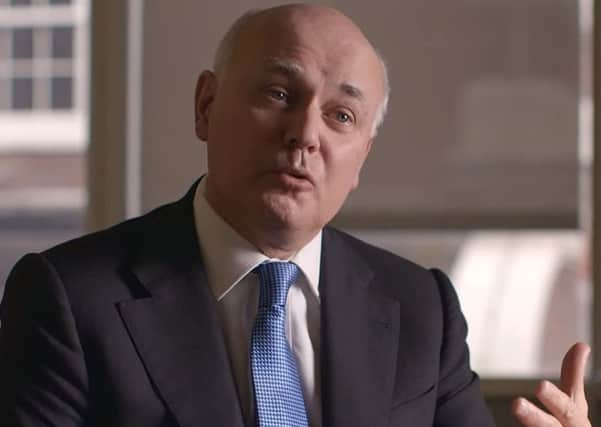Leader comment: Damning indictment of politicians in EU campaign


Among the grand claims made during the EU referendum campaign was the memorable assertion the NHS could be better off by £350 million a week if Britain voted to leave.
An obvious vote-winner, it was printed on the side of a big red battle bus which leading Brexiteers including Boris Johnson and Iain Duncan Smith took turns posing in front of.
Advertisement
Hide AdAdvertisement
Hide AdYet within hours of Vote Leave claiming its historic victory, the argument began to unravel, with leading figures distancing themselves from suggestions UK subsidies to the EU could be diverted into funding cancer drugs and paying nurses a decent wage.
The episode was perhaps among those which have led the Electoral Reform Society to describe the standard of campaigning during the referendum as “dire”.
In a major report published today, the ERS says the debate was dogged by “glaring democratic deficiencies” that left voters feeling “ill-informed” and disengaged.
Polling by the ERS showed the intervention of high-profile political figures in the campaign “largely failed to engage or convince voters”, with many voters appearing switched off by the “usual suspects”.
The body says its findings show there is now a need for a “root and branch review” of how future referendums are carried out.
It points to Scotland’s independence referendum which it says was “vibrant and well-informed” and in stark contrast to the misleading claim and counter-claim of the EU debate. Perhaps the most interesting suggestion is for an official public body to be able to intervene when erroneous claims are made during a campaign.
The idea, which has already been dubbed a “truth commission”, is certainly an interesting proposal.
It is also likely to be welcomed by the public, which frequently complained during the campaign about the lack of “facts” being supplied by our politicians.
Advertisement
Hide AdAdvertisement
Hide AdVariations of an ‘independent’ arbiter have been attempted in Australia, and have proved popular. But we need to be careful before we rush into something dramatic following just one referendum campaign.
As the ERS report highlights, the 2014 independence debate showed how political debate which is fierce but fair-minded can have the ability to foster engagement and lead to record turnouts.
The electorate is often cynical about politicians, sometimes fairly other times less so. While voters have grown to expect spin and are well accustomed to taking things with a pinch of salt, they should not be forced to endure downright lies.
Sadly, some of the rhetoric during the EU referendum campaign – on both sides of the debate – fell into that category. The ERS is right when it says some of the most misleading claims were peddled with “total impunity”.
The setting up of a truth commission may go some way to correcting that.
Ultimately, however, it is up to our politicians not to willingly mislead.
Deprivation index carries risks
The news that seven of Scotland’s most deprived areas are in Glasgow and that Paisley’s Ferguslie Park is the poorest neighbourhood in the country will perhaps not come as a great surprise.
Yet those were among the key findings of the Scottish Index of Multiple Deprivation (SIMD), which was published yesterday.
Advertisement
Hide AdAdvertisement
Hide AdStatisticians rated nearly 7,000 areas across the country based on standards including income, employability and health.
Published every four years, the index has a website where users can search for the relative affluence of their street.
The Scottish Government says the SIMD is important because it helps make sure public funding and services are targeted most effectively to those who need them the most.
But the tool also risks stigmatising some of the country’s most challenged communities.
When it comes to education, the Scottish Government has a long-held aversion to league tables compiled by the media showing where the best and worst schools are.
Yet the SIMD runs the risk of becoming exactly that, a league table which will do nothing more than help push up property prices in the most affluent areas and ghetto-ise others.
It also risks providing a misleading picture.
According to the report, two out of three people who are income-deprived do not live in deprived areas – while just under one in three people living in a deprived area are classified as income deprived. We don’t need a tool to tell us Glasgow has socio-economic challenges other parts of Scotland do not.
The SIMD must make sure resources are deployed effectively, otherwise it only undermines the areas it is trying to help.